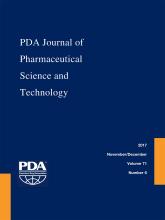Abstract
The development of protein therapeutics requires stabilization of these labile molecules during shipment and storage. Biologics, particularly monoclonal antibodies, are frequently packaged at high concentration in prefillable syringes traditionally made of glass. However, some biologics are unstable in glass due to sensitivity to silicone oil, tungsten, glue, or metal ions. Syringes made from the plastic cyclic olefin polymer, Daikyo Crystal Zenith® (CZ), with a Flurotec-laminated piston, have none of these issues. This study compared the stability of several proteins including biotherapeutics when stored up to 14 months at 5 °C and 25 °C in prefillable siliconized syringes made of glass or silicone oil-free CZ syringes, and when subjected to mild agitation by end-over-end rotation at room temperature. At each time point, proteins were analyzed by several techniques including turbidity, size exclusion high-performance liquid chromatography, reversed phase high-performance liquid chromatography, ion-exchange chromatography, electrophoresis, and light scattering to monitor changes in aggregation and degradation. The results show that proteins have comparable stability when stored in glass syringes or in syringes made of CZ sterilized by E-beam or autoclave. In addition, proteins stressed by agitation were generally more stable and aggregated less in syringes made of CZ than in ones made of glass.
LAY ABSTRACT: Biotherapeutic protein drugs such as monoclonal antibodies are frequently packaged at high concentration in prefillable syringes, which allows the drug to be directly administered by the patient or caregiver. Protein drugs, or biologics, can be unstable, and may aggregate, particularly when shaken. These aggregates can be immunogenic, stimulating the body's immune system to produce antibodies that can reduce the drug's efficacy. Although prefillable syringes are traditionally made of glass, some biologics are unstable in glass syringes due to the presence of substances used in their manufacture, including silicone oil, which is necessary for lubricity. Syringes made from the plastic cyclic olefin polymer, Daikyo Crystal Zenith® (CZ), have none of these issues. This study compared the stability of several biotherapeutic proteins when stored up to 14 months at 5 °C and 25 °C in prefillable siliconized syringes made of glass or silicone oil-free CZ syringes, and when mildly agitated at room temperature. Proteins were analyzed by several techniques to detect changes in aggregation and degradation. The results show that biotherapeutic proteins have similar stability whether stored in syringes made of glass or CZ. In addition, proteins subjected to agitation were generally more stable and aggregated less in CZ syringes than in glass syringes.
- Prefillable syringe
- Silicone oil
- Tungsten
- Crystal Zenith
- CZ
- Protein aggregation
- Biotherapeutic protein
- Protein stability
- © PDA, Inc. 2017
PDA members receive access to all articles published in the current year and previous volume year. Institutional subscribers received access to all content. Log in below to receive access to this article if you are either of these.
If you are neither or you are a PDA member trying to access an article outside of your membership license, then you must purchase access to this article (below). If you do not have a username or password for JPST, you will be required to create an account prior to purchasing.
Full issue PDFs are for PDA members only.
Note to pda.org users
The PDA and PDA bookstore websites (www.pda.org and www.pda.org/bookstore) are separate websites from the PDA JPST website. When you first join PDA, your initial UserID and Password are sent to HighWirePress to create your PDA JPST account. Subsequent UserrID and Password changes required at the PDA websites will not pass on to PDA JPST and vice versa. If you forget your PDA JPST UserID and/or Password, you can request help to retrieve UserID and reset Password below.






